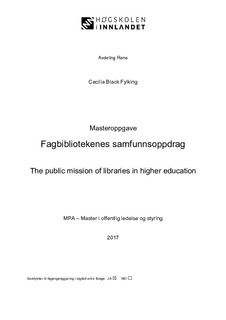Fagbibliotekenes samfunnsoppdrag
Abstract
Bakgrunn: Det eksisterer få styringssignaler omkring hva UH-fagbibliotekenes samfunnsoppdrag er eller skal utgjøre. Hvordan fagbibliotekene defineres er opp til den enkelte utdanningsinstitusjon, og det muliggjør en mer uformell og kulturell fortolkning av styringsdokumentene som foreligger. Av den grunn er det interessant å se på om forståelsen av samfunnsoppdraget varierer avhengig av organisatorisk nivå. Problemstilling: Denne oppgavens problemstilling er: Hvordan forstår fagbibliotekene i universitets- og høgskolesektoren sitt samfunnsoppdrag som forvaltere og formidlere av kunnskap? Tre forskningsspørsmål bidrar til å besvare denne problemstillingen: 1) Hvilken forståelse er det for samfunnsoppdraget hos ansatte i fagbibliotek, og hvordan praktiseres dette i daglig drift? 2) Er det noen forskjell på hvordan ledere forstår og implementerer samfunnsoppdraget, og hva ansatte opplever i praksis? 3) Forholder ansatte i fagbibliotekene seg til samfunnsoppdraget slik det er uttrykt formelt fra departement og i lovverk, og i tilfelle hvordan? Teoretisk grunnlag: Problemsstillingen belyses gjennom organisasjonsteori, hvor fokus ligger på instrumentelt og institusjonelt perspektiv. Disse perspektivene gir grunnlag for en rekke forventninger til hvordan informantene kan forstå og praktisere fagbibliotekenes samfunnsoppdrag. Metode: Dybdeintervjuer med seks ansatte i fagbibliotek ved to offentlige høgskoler danner grunnlaget for empirien. Disse informantene arbeider på ulikt organisatorisk nivå, og bidrar dermed til flere perspektiver på problemstillingen. Resultater: Funnene viser at hovedbibliotekarer i høyere grad forholder seg til de formelle styringssignalene når de skal definere oppdraget, mens ansatte i bibliotekene forstår oppdraget unikt, basert på arbeidsoppgaver og erfaring. Som en konsekvens av dette er forståelsen av oppdraget er ikke entydig hos informantene. De formelle styringssignalene gjennomgår en fortolkningsprosess jo lenger ned i organisasjonen man kommer. Ansatte i bibliotekene vil i hovedsak se disse styringssignalene fra et kulturelt og praktisk perspektiv. Engelsk sammendrag (abstract) Background: Few official documents describe the public mission of the academic libraries in higher education. How these libraries are defined depends on each educational institution. That gives a possibility for a more informal and cultural interpretation of the steering documents. Hence, it is interesting to explore if the understanding for the public mission changes due to organizational levels. Thesis statement: The purpose of this study is to identify how academic libraries in public universities understand their public mission as knowledge administrators and disseminators. Three research questions support the thesis statement: 1) In what manner do employees in academic libraries understand the public mission and how is it manifested in daily practice? 2) Is there a difference between how leaders understand and implement the public mission and what the employees experience in daily practice? 3) Do employees in the libraries relate to the public mission as expressed in formal documents from the ministry and in the legal system, and if so, how? Theoretical framework: The thesis statement is analyzed through organizational theory, with focus upon instrumental and institutional theory. These perspectives give grounds to eight expectations as to how the informants may understand and practice the academic libraries public mission. Research design: The empirical data is obtained from in-depth interviews with six employees from two different public universities. The informants work in three different organizational levels, and hereby contribute with distinct perspectives to the thesis statement. Findings: The findings show that head librarians are more concerned with the formal steering documents when they are to define the public mission, while the librarians have a more individual interpretation, based on their work assignments and experience. Consequently, the comprehension of the public mission is unique. The formal steering documents go through an interpretation process on its way down the organizational hierarchy. The employees understand these documents through a cultural and practical perspective.
Description
Erfaringsbasert master, 90 studiepoeng.
